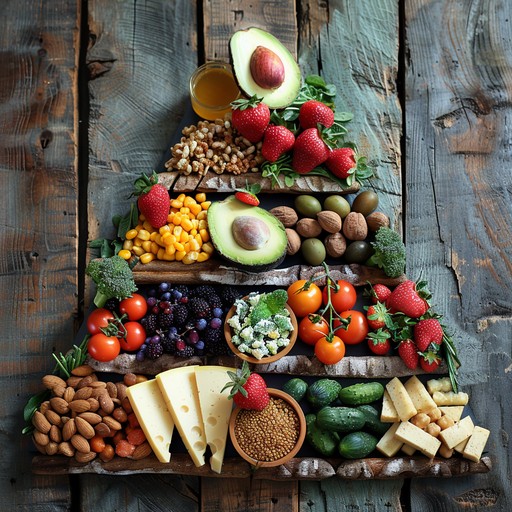Nutrition is a critical part of health and development. Better nutrition is related to improved infant, child and maternal health, stronger immune systems, safer pregnancy and childbirth, lower risk of non-communicable diseases (such as diabetes and cardiovascular disease), and longevity.
Eating foods that are high in fibre, vitamins, healthy fats, and other nutrients helps to prevent common diseases. The foods you eat contain all of the nutrients that your body uses to fuel itself and your diet greatly contributes to your overall health.
A healthy diet rich in fruits, vegetables, whole grains and low-fat dairy can help to reduce your risk of heart disease by maintaining blood pressure and cholesterol levels. High blood pressure and cholesterol can be a symptom of too much salt and saturated fats in your diet.
Nutrients give your body energy and enable bodily functions. They are usually classified in two major groups: Macronutrients, in the form of protein, carbohydrate, or fat, primarily provide energy to your body. The different macronutrients serve different energy pathways and functions in the body.
A healthy diet is essential for good health and nutrition. It protects you against many chronic noncommunicable diseases, such as heart disease, diabetes and cancer. Eating a variety of foods and consuming less salt, sugars and saturated and industrially-produced trans-fats, are essential for healthy diet.

Nutrition and its components (macronutrients, micronutrients, vitamins, minerals)
What are Nutrients?
Nutrients are the compounds in food that provide us with energy that facilitates repair and growth and helps to carry out different life processes.”
Not all nutrients provide energy but are necessary for some form or the other. These nutrients are divided into two categories:
Macronutrients, which are required by the body in large amounts.
Micronutrients, which are required by the body in small amounts.
nutrients
Types of Nutrients
In general, there are two types of nutrients:
a.) Macronutrients
b.) Micronutrients
Macronutrients include fats, proteins, and carbohydrates. Micronutrient provides essential components for metabolism to be carried out. They also build and repair damaged tissues in order to control the body process. Micronutrients include calcium, iron, vitamins, iron, minerals and vitamin
Above nutrients could be obtained from the environment. Macronutrients provide energy to a living being for the function of the metabolic system. They provide massive energy has it is converted used to obtain energy. Macronutrients include fats, proteins, and carbohydrates.
Micronutrient provides essential components for metabolism to be carried out. They also build and repair damaged tissues in order to control the body process. Micronutrients include calcium, iron, vitamins, iron, minerals and vitamin C.
Macronutrients that provide energy
- Carbohydrates.
- Protein.
- Fats.
- Saturated (i.e., stable) fatty acids.
- Monounsaturated (i.e., semi-stable) fatty acids.
- Polyunsaturated (i.e., unstable) fatty acids.
- Essential fatty acids.
Micronutrients
They are boron (B), chloride (Cl), copper (Cu), iron (Fe), manganese (Mn), molybdenum (Mo), nickel (Ni) and zinc (Zn). Micronutrients are important for plant growth, as plants require a proper balance of all the essential nutrients for normal growth and optimum yield.

Important Nutrients in Food
There are several nutrients that cannot be synthesized by the body and have to be taken externally through food. These are vital for the proper functioning of the body. The important nutrients and their functions include are mentioned below:
There are 6 main nutritional components of food which are: carbohydrates, proteins, fats, vitamins, minerals, and water. Carbohydrates, proteins, and fats are considered macronutrients and are what provide you with calories, or what I refer to as energy.
Essential nutrients
Carbohydrates
It is one of the main sources of energy for human beings. It comprises of three types of carbohydrates and they include fibre, sugar, and starch. They are usually low calories and thus help in maintaining a healthy diet.
Calcium
It is a mineral that is vital for building strong bones and teeth. In very fewer quantities it is also needed to our nerves, muscles work and heart. Sources of calcium include pudding, milk, yoghurt, tofu, canned fish, and fresh leafy green vegetables. Lack of calcium leads to a disease called Osteoporosis.
Cholesterol
It is essential for the brain, nerves, and development of cells. It plays an important role in the forming of enzymes and hormones. Foods include cheese, milk, chicken, beef, and fish.
Fats
It is one of the most important sources of calories. One gram of fat consists of 9 calories. It is almost twice of calories that we get from carbohydrates and proteins. Fat is usually found in foods that we use in cooking, as spreads on bread and it also found in snacks, pastries.
Iron
It is a constituent of our red blood cells. Its function is to carry oxygen from our lungs to organs, muscles, and cells. Food sources include spinach, soybeans and other leafy vegetables.
Protein
They are made of amino acids. We can obtain protein in foods such as nuts, lentils, beef, rice, chicken, beef etc.
Sodium
Foods like milk and fresh vegetables contain sodium. Lack of sodium might lead to high blood pressure.
Minerals
Minerals are inorganic elements that come from soil and water, and are absorbed by plants or eaten by animals
Also Read: Difference between Macronutrients and Micronutrients
Functions of Nutrients
The important functions of nutrients include:
i.) They are the main source of energy for the body.
ii.) They help in building and repairing body tissues.
iii.) Increases the absorption of fat-soluble vitamins.
iv.) Helps in the synthesis of collagen.
v.) Provides proper structure to the blood vessels, bones and ligaments.
vi.) They also help in maintaining the homeostasis of the body.
Common Nutritional Deficiencies and Their Effects
Maintenance of medical and neurologic health requires adequate ingestion, absorption, and storage of vitamins and minerals. Nutritional deficiency disorders are prevalent worldwide and result primarily from malnourishment, chronic alcoholism, malabsorption, bariatric surgery, eating disorders, and chronic diseases.
Deficiencies in iron, vitamin A and iodine are the most common around the world, particularly in children and pregnant women.
Iron deficiency is one of the most common nutrient deficiencies in the world, affecting more than 25% of people worldwide. This number rises to 47% in preschool children
Common Signs You’re Deficient in Vitamins and Minerals
a) Brittle hair and nails.
b) Mouth ulcers.
c) Bleeding gums.
d) Vision problems.
e) Flaky skin.
f) Hair loss.
g) Bumpy skin.
h) Restless leg syndrome.
Practical Tips for a Balanced Diet
What is a balance diet?
A balanced diet contains an adequate amount of all the nutrients required by the body to grow, remain healthy and be disease-free. In addition, a healthy, balanced diet provides the necessary energy requirement, protects against vitamin, mineral, and other nutritional deficiencies, and builds up immunity.
How can we maintain a balanced diet in Nigeria? Recommended dietary guidelines For Nigerian
a) Protein: Sources include beans, fish, poultry, eggs, and lean meat.
b) Carbohydrates: Opt for whole grains, fruits, vegetables, and legumes.
c) Fats: Choose healthy fats like avocado, nuts, seeds, and olive oil

Eating a balanced diet
- Eat at least 5 portions of a variety of fruit and vegetables every day (see 5 A Day)
- Base meals on higher fibre starchy foods like potatoes, bread, rice or pasta.
- Have some dairy or dairy alternatives (such as soya drinks)
- Eat some beans, pulses, fish, eggs, meat and other protein
There are seven essential factors for a balanced diet: carbs, protein, fat, fibre, vitamins, minerals and water.
What is the best way to maintain a balanced diet?
8 tips for healthy eating
- Base your meals on higher fibre starchy carbohydrates.
- Eat lots of fruit and veg.
- Eat more fish, including a portion of oily fish.
- Cut down on saturated fat and sugar.
- Eat less salt: no more than 6g a day for adults.
- Get active and be a healthy weight.
- Do not get thirsty.
- Do not skip breakfast.
Read Also : 35 Nigerian Food Ideas for Diabetics (Exclusively Naija), visit Ozzie Health Consult
Conclusion
Maintain a calm environment with no distractions. Be aware of a person’s preferred time for eating their main meals of the day (or any meal). Consider whether they would prefer to eat at the table or at home rather than out
Schools can incorporate fun and variety into their cafeteria menus by hosting theme days centered around different cuisines or food groups, such as “Taco Tuesday” or “Vegetable Stir-Fry Day.” They can also offer build-your-own salad or wrap stations featuring a variety of fresh ingredients and toppings for .



